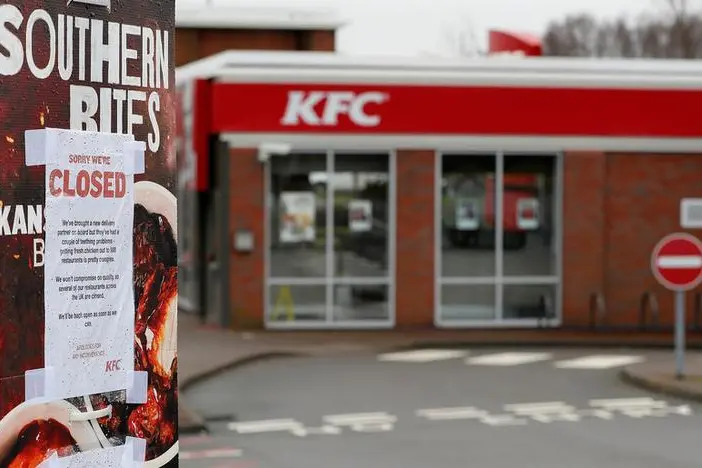PHOTO
LONDON - KFC’s penny-pinching ways have left it stuffed. The fried-chicken chain owned by Yum Brands had to close hundreds of its UK restaurants after running out of poultry. Its plan to cut costs by ditching its old food supplier for a cheaper one backfired. The cock-up shows that chasing higher margins is no sure way to feather your nest.
KFC made two bold decisions on Valentine’s Day. One was to sell scratch and sniff cards for lovers keen to bask in the scent of fried poultry. The other was to switch its main supplier for roughly 900 restaurants across the country to a consortium led by DHL, a unit of Deutsche Post. The appeal, according to a BBC report, was to lower costs. But the logistics firm’s plan to “revolutionize the UK foodservice distribution market” got off to a bad start. Just two days after the switch, hundreds of outlets had closed as ingredients for KFC’s Boneless Banquet and Big Daddy box meals ran out.
The financial hit is probably manageable. Loyal customers are unlikely to shun KFC’s food because of one missed meal. But the mess still looks like bad judgment. Fast-food joints need food to be delivered on time and safely, and so tend to stick with specialist suppliers, even though they are more expensive than traditional distributors. And DHL’s plan may have been too clever by half. It planned to supply all of KFC’s UK business from just one major centre, whereas the previous distributor Bidvest – which handles deliveries for rival casual dining brands Nando’s, TGI Friday’s and Pizza Express – uses several distribution hubs, partly to spread the risk.
Moreover, KFC’s UK division doesn’t look especially flabby. Its 12.6 percent operating margin in 2016, the most recent numbers available, are on a par with those of competitor Wagamama. That suggests it wasn’t really necessary to risk the disruption of its key ingredient. History might have helped KFC avoid the mistake. Back in 2010 Burger King considered switching to DHL, but relented, according to the Grocer magazine. Now it faces the thorny choice of hoping the deal works out, or chickening out and going back to its old supplier.
CONTEXT NEWS
- Fast-food chain KFC said on Feb. 19 that it had to close hundreds of outlets across the United Kingdom due to a shortage of chicken meat.
- The chain, which is owned by Yum Brands, switched its food delivery contract to a consortium of DHL and QSL from long-term supplier Bidvest Logistics on Feb. 14. Bidvest also supplies Burger King, Nando's, Pizza Express and Pret A Manger.
(Editing by Neil Unmack and Bob Cervi)
© Reuters News 2018





















